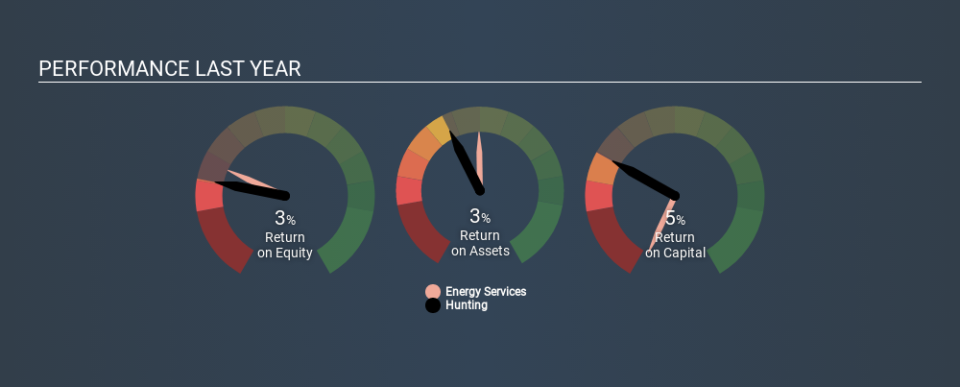Should Hunting PLC’s (LON:HTG) Weak Investment Returns Worry You?

Today we'll look at Hunting PLC (LON:HTG) and reflect on its potential as an investment. Specifically, we'll consider its Return On Capital Employed (ROCE), since that will give us an insight into how efficiently the business can generate profits from the capital it requires.
First up, we'll look at what ROCE is and how we calculate it. Then we'll compare its ROCE to similar companies. Last but not least, we'll look at what impact its current liabilities have on its ROCE.
What is Return On Capital Employed (ROCE)?
ROCE measures the 'return' (pre-tax profit) a company generates from capital employed in its business. In general, businesses with a higher ROCE are usually better quality. Ultimately, it is a useful but imperfect metric. Author Edwin Whiting says to be careful when comparing the ROCE of different businesses, since 'No two businesses are exactly alike.
So, How Do We Calculate ROCE?
The formula for calculating the return on capital employed is:
Return on Capital Employed = Earnings Before Interest and Tax (EBIT) ÷ (Total Assets - Current Liabilities)
Or for Hunting:
0.047 = US$60m ÷ (US$1.4b - US$145m) (Based on the trailing twelve months to December 2019.)
Therefore, Hunting has an ROCE of 4.7%.
Check out our latest analysis for Hunting
Is Hunting's ROCE Good?
ROCE is commonly used for comparing the performance of similar businesses. In this analysis, Hunting's ROCE appears meaningfully below the 13% average reported by the Energy Services industry. This performance is not ideal, as it suggests the company may not be deploying its capital as effectively as some competitors. Setting aside the industry comparison for now, Hunting's ROCE is mediocre in absolute terms, considering the risk of investing in stocks versus the safety of a bank account. It is possible that there are more rewarding investments out there.
Hunting delivered an ROCE of 4.7%, which is better than 3 years ago, as was making losses back then. That suggests the business has returned to profitability. You can see in the image below how Hunting's ROCE compares to its industry. Click to see more on past growth.
When considering ROCE, bear in mind that it reflects the past and does not necessarily predict the future. ROCE can be deceptive for cyclical businesses, as returns can look incredible in boom times, and terribly low in downturns. ROCE is, after all, simply a snap shot of a single year. Remember that most companies like Hunting are cyclical businesses. Since the future is so important for investors, you should check out our free report on analyst forecasts for Hunting.
How Hunting's Current Liabilities Impact Its ROCE
Current liabilities are short term bills and invoices that need to be paid in 12 months or less. The ROCE equation subtracts current liabilities from capital employed, so a company with a lot of current liabilities appears to have less capital employed, and a higher ROCE than otherwise. To check the impact of this, we calculate if a company has high current liabilities relative to its total assets.
Hunting has total assets of US$1.4b and current liabilities of US$145m. As a result, its current liabilities are equal to approximately 10% of its total assets. It is good to see a restrained amount of current liabilities, as this limits the effect on ROCE.
What We Can Learn From Hunting's ROCE
With that in mind, we're not overly impressed with Hunting's ROCE, so it may not be the most appealing prospect. Of course, you might also be able to find a better stock than Hunting. So you may wish to see this free collection of other companies that have grown earnings strongly.
Hunting is not the only stock that insiders are buying. For those who like to find winning investments this free list of growing companies with recent insider purchasing, could be just the ticket.
Love or hate this article? Concerned about the content? Get in touch with us directly. Alternatively, email editorial-team@simplywallst.com.
This article by Simply Wall St is general in nature. It does not constitute a recommendation to buy or sell any stock, and does not take account of your objectives, or your financial situation. We aim to bring you long-term focused analysis driven by fundamental data. Note that our analysis may not factor in the latest price-sensitive company announcements or qualitative material. Simply Wall St has no position in any stocks mentioned. Thank you for reading.

